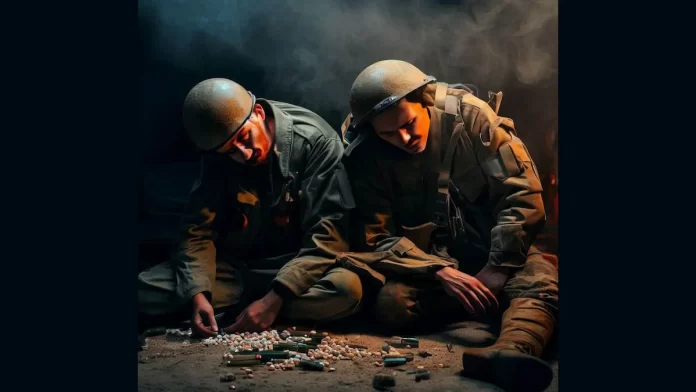The recent reports of Russian soldiers entering the battlefield under the influence of drugs are deeply concerning. According to military experts, the practice is common in warfare.
Russia has allegedly taken to chemically lowering its soldiers’ inhibitions to guarantee these ill-trained civilians and convicts continue to fight no matter the odds in the ongoing war in Ukraine, according to a UK defense think tank”, reported Business Insider.
This practice, with its cruel history and continued occurrence, sheds light on the ethical considerations surrounding the use of chemically altered soldiers in warfare.
Cruel History and Purpose
The use of drugs to enhance soldiers’ performance is not a new phenomenon. Throughout history, various nations have employed this tactic in warfare.
During World War I, British soldiers were supplied with heroin, while the Nazis administered methamphetamine to their troops to increase awareness and vigilance.
Similarly, the US military distributed painkillers and stimulants, such as “pep pills” or speed, during the Vietnam War.
However, these instances demonstrate a willingness to compromise soldiers’ well-being for tactical advantages.
With respect to India, many medieval writers and travellers have recorded Rajput practice of heavy usage of Drugs and opium during wars.
According to Abraham Eraly, Rajput soldiers would take multiple doses of opium before fighting even during British times.
KK Ganguly, K. Sharma, and Krishnamachari’s research on opium usage also mention that the Rajputs would use opium during wars, important religious ceremonies, relief from emotional distress, for increasing longevity and for enhancing sexual pleasure.
Opium was also consumed when bards would recite exaggerated poetry and stories about the Rajputs and their ancestors.
After the Independence of India, and the political integration of India, educated Rajputs have largely discontinued both the usage of opium and recitation of bardic poetry.
Modern Instances & Ethical Considerations
The recent report on Russian soldiers in the ongoing conflict in Ukraine indicates the continuation of this cruel practice.
Russian soldiers, particularly from the “disposable infantry,” which consists of conscripts, prisoners, and draftees, are allegedly under the influence of amphetamines or other narcotic substances.
They are deployed in small groups to “skirmish” with Ukraine’s defense until killed.
Ukrainian troops have reported Russian soldiers continuing to advance even after sustaining injuries.
Ethically, the use of drugs to alter soldiers’ behavior raises concerns regarding their physical and mental well-being.
It disregards the individual rights and dignity of soldiers, treating them as expendable resources rather than human beings. Moreover, it poses severe risks to their health and long-term rehabilitation.
Islamic Prohibitions
In Islamic teachings, the use of drugs and intoxicants is strictly prohibited. The Quran and Hadiths emphasize the preservation of health, sanity, and clear judgment.
Muslims are encouraged to approach battles with a clear mind and a deep understanding of their purpose. Islam places great importance on a just cause and the defense of one’s nation or people.
Throughout history, there have been notable instances where Muslim armies achieved remarkable victories without resorting to drug use.
The Battle of Badr, a pivotal moment in Islamic history, saw a smaller Muslim force emerge victorious due to their unwavering faith, discipline, and strategic planning.
Similarly, during the Battle of Yarmouk, the Muslim army’s determination and belief in their cause allowed them to triumph over a much larger Byzantine force.
Case of Mughal Emperor Babur
After defeating Ibrahim Lodhi in the 1st battle of Panipat, Mughal Emperor Babur had to face a bigger and much stronger adversary Maharana Sanga, a powerful Rajput ruler of Rajasthan with pan-India imperial ambitions.
Babur’s army largely consisting of impatient and impoverished Turk and Afghan tribes was already disenchanted by the harsh landscape and hot weather of India.
It became further terrified when it heard the frightful tales of rapidly advancing Rajput armies of Maharana Sanga and his allies. Besides, superstitious rumours and gossips further exerted the odds against Babur.
Babur too was disappointed and sensing his defeat in the upcoming battle, he prepared for martyrdom.
He decided to get himself rid of all sinful and forbidden acts in Islam. He and his generals also made a significant decision – they collectively denounced the consumption of wine.
Documenting this incident in his acclaimed memoir Baburnmma, he wrote-
“That night and next day some 300 Begs (Army Commanders) and persons of the household, soldiers and not soldiers, renounced wine. What wine we had with us was poured on the ground. What Baba Dost had brought was ordered salted to make vinegar. At the place where the wine was poured upon the ground, a well was ordered to be dug, built up with stone and having an almshouse beside it.”
As usual, Rajput armies entered the battlefield high on drugs and a fierce battle ensued. However, quite surprisingly, the Mughals won this historic battle and became masters of the subcontinent for centuries to come.
Later, thanking God Almighty for the victory, Babur wrote-
“For the sake of Islam, I wandered in the wilds, prepared for war with mighty pagans and Hindus, resolved myself to meet the martyr’s death. Thanks be to God! A Ghazi I became.”
The Contrast: Power of Purpose & Leadership
The Russians’ alleged use of drugs to compensate for the lack of purpose and leadership highlights a stark contrast with their Ukrainian counterparts.
The Ukrainians, fighting to defend their nation against an enemy seeking to destroy it, possess a strong sense of purpose.
They understand the stakes and the significance of their fight. In contrast, the Russian soldiers appear to lack this purpose and motivation, leading their leaders to resort to drugs to ensure their engagement on the battlefield.
